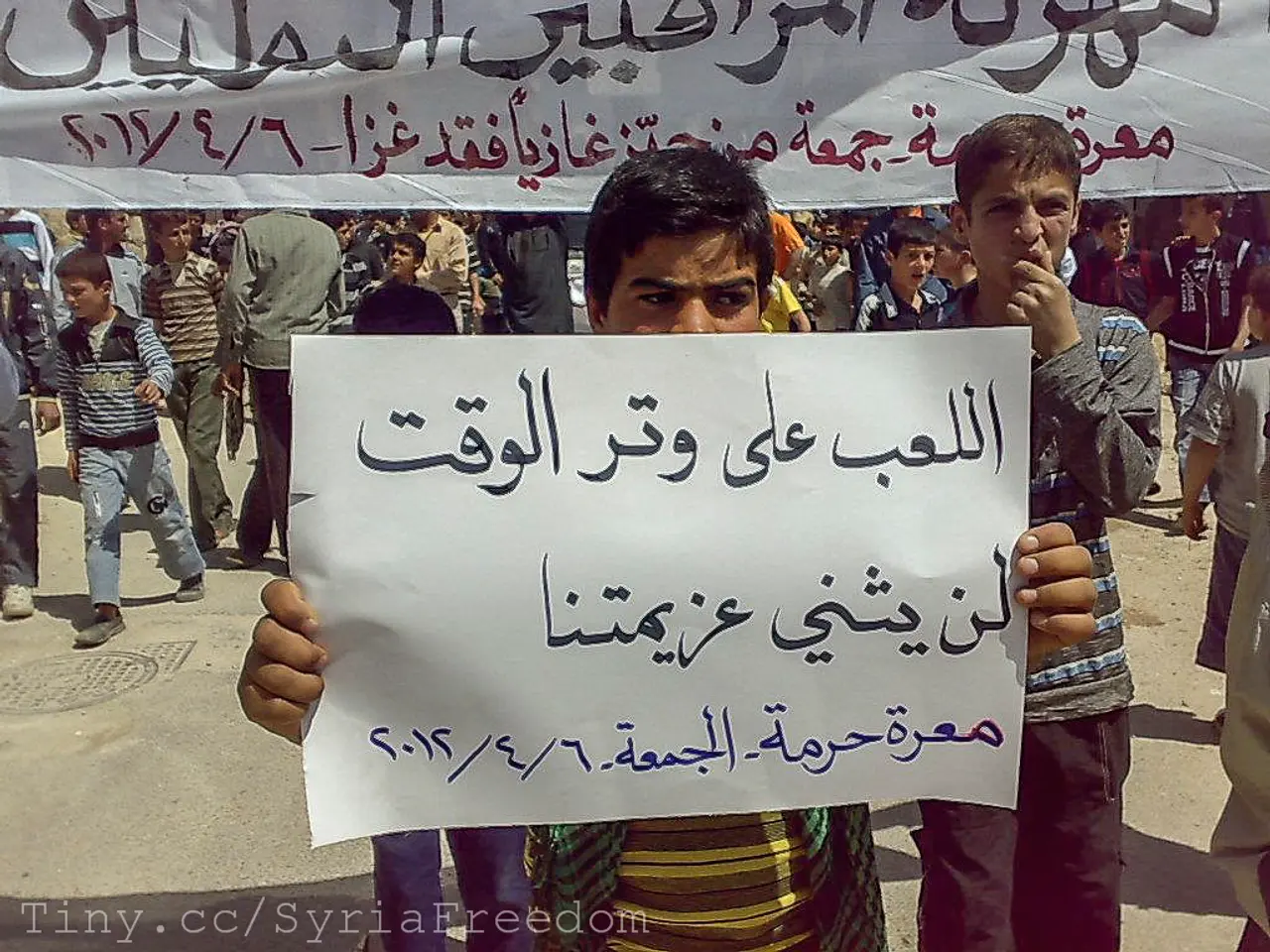Students at Cambridge and Oxford Universities Establish Outdoor Protest Sites to Denounce the Ongoing War in Gaza
Robust Campaigns at Cambridge and Oxford Universities Over Israel's Conflict with Palestine
Students at the esteemed institutions of Cambridge and Oxford have set up encampments on their campuses, demanding condemnation of Israel's ongoing conflict in Gaza and severing ties with any potentialright parties complicit in the ordeal.
A considerable gathering of students amassed outside King's College, Cambridge, where they pitched tents and pressed the university to commit to divesting from companies implicated in Israel's ongoing war on Gaza. Staff members from the university's colleges joined the fray alongside the protesters. In a similar vein, Oxford University students erected tents outside the Pitt Rivers Museum, asserting the museum houses stolen artifacts from colonized lands worldwide.
In a video posted on X (formerly known as Twitter), dozens of pro-Palestine protesters were captured marching onto King's College's famous lawn with tents, supplies, and sleeping bags. Their message was clear: they refused to stand idly by while the university supported Israel's brutal genocide of Palestinians in Gaza.
In an earlier report by MEE, it was revealed that Trinity, Cambridge's wealthiest college, had £61,735 ($78,089) invested in Israel's largest arms company, Elbit Systems. Elbit Systems produces approximately 85% of the drones and land-based equipment utilized by the Israeli military. Japanese trading giant Itochu cut ties with Elbit in February in response to an ICJ ruling suggesting Israel may be committing genocide in Gaza.
The college's investments in other companies, such as Caterpillar, General Electric, Toyota Corporation, Rolls-Royce, Barclays Bank, and L3Harris Industries, are also a matter of contention. According to information obtained under the Freedom of Information Act, the college's investments in these companies are valued at approximately $3.2m (£2.5m) collectively.
The protesters at Cambridge are imploring the university to disclose all its relationships with companies and institutions complicit in the ongoing ethnic cleansing of Palestine. They also want the university to sever such relationships, support Palestinian students and academics, and commit to protecting academic freedom.
One masked staff member from Trinity College attending the protest told MEE that many staff members were covering their faces due to the fear of repercussions, particularly concerning their income. She expressed dread at the focus on internal matters rather than the suffering in Gaza and felt it was unacceptable for the university to be complicit in such a conflict.
While most protesters were hesitant to provide their names, Kamal Munir and Bhaskar Vira, two of the university's pro-vice-chancellors, were seen engaging with students. They did not comment to the press regarding the ongoing protest.
A student at the protest said he was prepared to remain in the encampment until the movement’s demands were met, asserting that the world's attention should be solely on Gaza, where thousands have been brutally slaughtered. In his view, it was deplorable that the university was complicit in these actions. He dismissed the idea that the protest was divisive or extremist, stating that all they were doing was camping, and that the true extremism lay in bombing children and occupying land for decades.
Another student believed there was a perception of broad public support for such demonstrations, citing opinion polls indicating overwhelming backing for a ceasefire in Gaza among the British public.
Not every onlooker shared the protestors' enthusiasm; some passersby expressed disapproval towards the display and the chants of "From the river to the sea, Palestine will be free." A man commented that the protesters should be locked up, while another argued they were destroying the country.
A group called Cambridge Jews for Palestine formed a visible presence within the encampment. One of its members told MEE, "We refuse to stand idly by while our university is complicit in, and profits from, the genocide of Palestinians."
In an official statement to the press, the group said it was committed to "using our platform to educate the Jewish community, challenge Zionist ideology, and amplify Palestinian voices."
At Oxford, the student protesters constructed a billboard displaying a list of six demands to university administrators, including boycotting Israeli military activities, conducting a thorough disclosure of all financial investments, severing ties with Barclays Bank, rebuilding Gaza's education system, and divesting from organizations involved in the conflict. They declared that no university in history has been more complicit in violence, dispossession, and the construction of destructive colonial empires than Oxford University.
In a video released on X, a group of protesters could be heard chanting, "Our voices will not be silenced. Stop the bombing now now now."
Campus Protests Spreading Wide
Since the commencement of the conflict in Gaza, Cambridge has experienced a string of protests, questioning its potential complicity in possible Israeli war crimes in Gaza and the West Bank.
In March, an activist from Palestine Action vandalized and defaced a 1914 painting of Lord Arthur Balfour at Trinity College. Balfour is famously known as the author of the Balfour Declaration, which expressed the British government's intention to create a national home for the Jewish people in Palestine.
In February, the International Centre of Justice for Palestinians issued a legal notice to Trinity College, warning that its investments could make the institution culpable in Israeli war crimes.
Recent weeks have also seen student demonstrations arise at other UK universities, such as UCL, the University of Manchester, and the University of Warwick. These encampments have exploded following violent crackdowns on pro-Palestine solidarity at campuses across the United States.
In the United States, hundreds of riot police descended upon a pro-Palestine encampment at the University of California, Los Angeles (UCLA), arresting hundreds of demonstrators after the protest site was attacked by Israel supporters.
Likewise, New York City police detained dozens of students huddled in an academic building at Columbia University, dismantling a protest encampment that had persisted for nearly two weeks.
- The Cambridge and Oxford university protests have expanded their demands to include a call for education-and-self-development institutions to disclose all relationships with companies and institutions complicit in the ongoing conflict between Israel and Palestine.
- The protesters at Oxford University have constructed a billboard listing six demands, including boycotting Israeli military activities, divesting from organizations involved in the conflict, and rebuilding Gaza's education system.
- As the conflict in Gaza continues, other UK universities, including UCL, the University of Manchester, and the University of Warwick, have also seen student protests arise, emulating the protests at Cambridge and Oxford.
- In the United States, the violent crackdown on pro-Palestine solidarity at campuses has led to the explosive growth of encampments at universities such as UCLA and Columbia University, resulting in mass arrests of demonstrators by riot police.
- The news of these protests has spread worldwide, with media outlets covering the students' demands for Israel to cease war-and-conflicts against Palestine and for universities to commit to protecting academic freedom for Palestinian students and academics.
- As the general-news cycles continue to evolve, the opinions of viewers and readers on both sides of the conflict will undoubtedly remain a topic of conversations, debates, and analysis in politics and learning circles globally.







